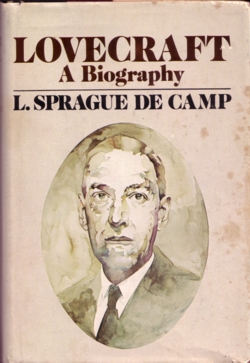Lovecraft A Biography by L. Sprague de Camp
Originally for Raw, New Things #2, 2/1/2001

I’ve been looking at personal memoirs, recently, and apparently the publishing world is on fire for them. I think that in addition to the usual looking back to the good old days, there is a current blandness of culture that comes with America’s tremendously pervasive mass media. Many people my age (all of 32) have had the same influences while growing up—Star Trek, Sesame Street, and the Brady Bunch. Previous to the 1950's, local events had more an effect on people than the mass media.
A book of memoirs I edited, Ticklebritches and the Cowboy, was a fascinating exercise because the people who the author, Lois McClurg, describes. Lois describes her fraternal grandmother as a fearless, tough, frontier woman who drank, cursed, rode, and shot as well as any man up to her death at 89, and shares a few stories she remembers. Lois’s father, a feckless dreamer with dozens of get rich quick schemes that never worked. What work he did do was as a trail guide, despite his overwhelming fear of snakes, which he inherited from his mother. It may be the effect of McClurg’s writing, or the distance through which I see these characters, but it seems like they were much more definite characters then we seem to get out of people today. The point of this long digression is that Lovecraft seemed to be very much a unique character, but that such people were not so rare back then.
It was very interesting to see what sorts of influences came into Lovecraft, and how he conducted his work. I haven’t read his letters, so this was really the first exposure I had to his epistolatory style, and it rather surprised me. More importantly, book also clears up a number of questions I had about Lovecraft’s life--had he indeed met Harry Houdini, how exactly did he manage to get married to Sonia Greene? For me, answering questions like this is what biographies are for, and in this respect, De Camp has done a fairly good job.
However, there are a few things about the book that bother me. De Camp seems to spend an inordinate amount of time apologizing for Lovecraft’s racism. I am slightly puzzled by this, although the book was admittedly written just after the civil rights movement had achieved many important victories. I get the feeling De Camp was uncomfortable with Lovecraft’s racism, and he seems to go to great lengths to show a "reformation of character" in that regard during Lovecraft’s forties. It is more praiseworthy to have shown these politically-incorrect views, I suppose, than to have glossed them over. Lovecraft was no saint, although the stigma of being a racist is heavier than many other character flaws, but does this detract from his writing? Yes, there are racist comments in Lovecraft’s stories. This simply demonstrates that he was not a particularly forward-thinking man. I’ve found the tendency among many people to wholly praise an individual, or wholly vilify them. Why is this? Can’t we stick to the fact that people are highly complex, and while some of their personality aspects are unpleasant, or even despicable, few people are entirely objectionable, or entirely saintly? Does the stain of racism place a cloud over everything Lovecraft did? I think not, any more than the same attitude wholly taints Twain or Shakespeare.
I am also puzzled by De Camp’s constant summarization of Lovecraft’s stories. I suspect that virtually anyone interested in Lovecraft’s biography has read the majority of his stories before moving on to his biography. Lovecraft’s primary legacy is that of his fiction. Certainly, the recapitulation sometimes served to point out interesting parallels between HPL’s life and his fiction, but more often it seemed to serve no purpose.
On the whole, I found De Camp’s biography of Lovecraft readable, and fairly complete-feeling. Many questions I had had about Lovecraft’s life are now answered. I cannot vouch for De Camp’s accuracy or factuality, however, I am not a Lovecraftian scholar, and I think this was supposed to be a more popular biography. Although it is fairly obvious that De Camp does not understand Lovecraft’s motivations in many places, much as he tries. I think De Camp’s error here is in trying. I do not feel that it is the biographer’s place to place a reasonable guess on motivations. They may present evidence for what they believe is their subject’s motivations, or offer the reader with a few possibilities as to their subject’s thoughts, but without good evidence, it shouldn’t be nailed down a single guess. Because such is the complex nature of humanity that we are not merely stranger than others think, we are often stranger than others can think.